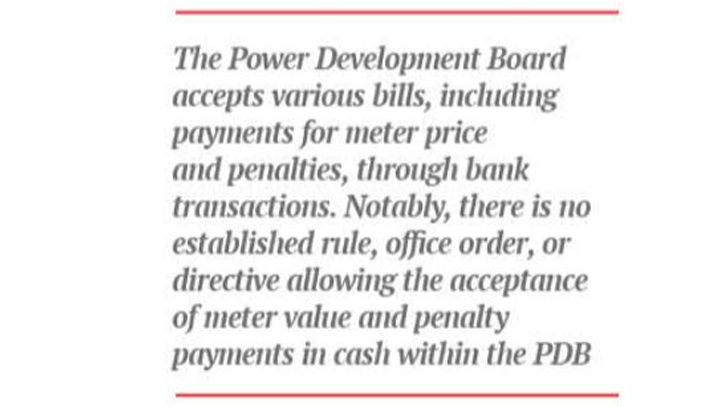
Photo : Messenger
The Anti-Corruption Commission (ACC) has taken legal action by filing a case against Deputy Assistant Engineer Chandni Akhtar and Executive Engineer Abdullah Al Mamun Sardar of the Bangladesh Power Development Board (BPDB) on charges of accepting bribe.
The case was filed on December 10 by Assistant Director Saifur Rahman at the ACC's integrated district office in Habiganj.
The case alleges that Rafiq Uddin was utilizing a three-phase prepaid meter connected to the Power Development Board in Habiganj. On May 31, 2022, facing issues due to the meter not being recharged, Rafiq verbally reported the matter to Chandni Akhtar, the engineer in charge of the respective feeder. In response, Chandni Akhtar, accompanied by a lineman, inspected the meter and informed Rafiq Uddin that the prepaid meter was malfunctioning. She conveyed that acquiring new meters was not immediately possible and they needed to be sourced from Sylhet.
Furthermore, Chandni Akhtar suggested a workaround, indicating that if Rafiq wanted to expedite the process and obtain a prepaid meter urgently, a bribe of Tk 2 lakh was required.
The case outlines that, after negotiation, Rafiq Uddin and Chandni Akhtar agreed on a bribe amount of 80,000 taka. On June 1, 2022, Rafiq Uddin, his brother Nashir Uddin, and Liaqat Ali, the previous owner of Rafiq Uddin's garage, visited Akhtar's office to proceed with the illicit transaction. Liaqat Ali handed over 60,000 rupees as a bribe to facilitate the installation of a new prepaid meter for the electricity connection. However, Chandni Akhtar, despite receiving the bribe, asserted that even if the payment was short by a single paisa from the agreed 80,000 taka, the meter would not be provided.
Subsequently, Chandni Akhtar demanded an additional 20,000 taka for the installation of the new meter. It's worth noting that during the bribery exchange, Nasir Uddin discreetly recorded a video using his mobile phone's hidden camera. This video later went viral on social media, exposing the corruption and leading to the Anti-Corruption Commission (ACC) filing a case against Chandni Akhtar and Executive Engineer Abdullah Al Mamun Sardar of the Power Development Board.
Chandni Akhtar's claim during the Anti-Corruption Commission (ACC) interrogation suggests that Rafiq Uddin submitted an application to the Executive Engineer on June 2, 2022, requesting to deposit the meter value and penalty money in cash. According to Chandni Akhtar, the Executive Engineer accepted the application and instructed him to take the necessary measures. Subsequently, Chandni Akhtar acknowledged receiving 80,000 takas in cash from Rafiq Uddin.
The contradiction in statements between Chandni Akhtar and Rafiq Uddin during the Anti-Corruption Commission (ACC) interrogation raises significant concerns. Rafiq Uddin, the meter customer, vehemently denies making any request regarding the payment of the meter price and penalty in cash. He refutes the authenticity of the application form, asserting that it is not his and that the signature on the form does not belong to him.
The revelation from the ACC that handwriting experts have reviewed the report and found that Rafiq Uddin did not write the application form. The claim suggests that Assistant Engineer Chandni Akhtar and Executive Engineer Abdullah Al Mamun Sardar were allegedly involved in fabricating the application form. This act was purportedly done as part of an attempt to conceal the illicit transaction of bribery.
The mention of rubbing the fake application in the letter receiving register indicates a potential effort to make the fabricated document appear official and legitimate within the records of the Power Development Board.
According to the ACC, the PDB has a standard practice of accepting various bills, including payments for meter prices and penalties, through the bank.
Chandni Akhtar's actions, encompassing the acceptance of money in cash, the use of excessive rhetoric during the transaction, the fabrication of a fake application form attributed to meter customer Rafiq Uddin, and its submission within official processes, along with attempts to conceal the bribery through manipulation of the letter receiving register, blatant acceptance of a bribe, collusion, and potential criminal breach of trust, constitute offenses punishable under various sections of the Penal Code, 1860, and the Prevention of Corruption Act, 1947.
Messenger/Fameema








